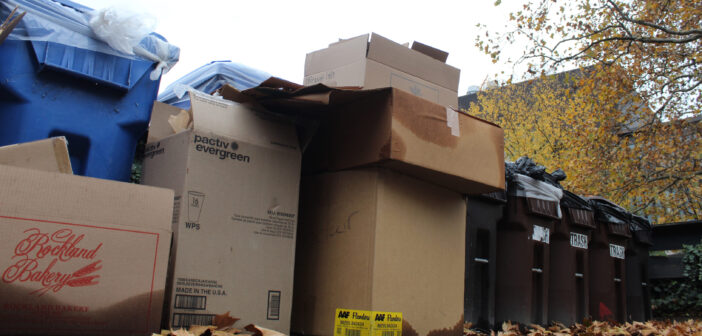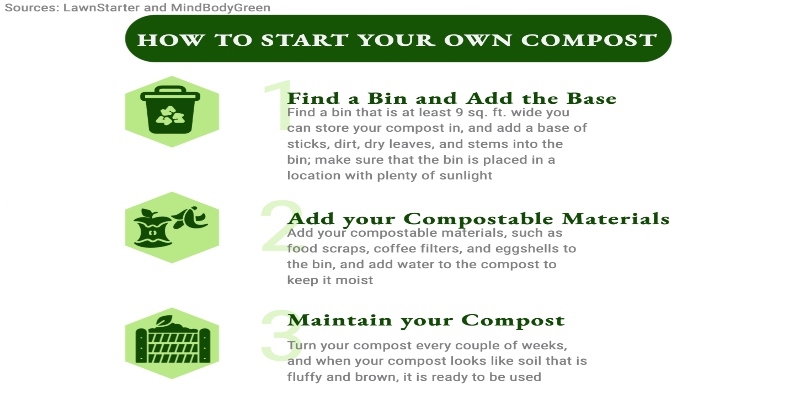Lehigh University and the Bethlehem community are making individual and group efforts toward becoming more sustainable.
Sarah Wilhelm, ‘25, is the president of the Conservation Club at Lehigh. Wilhelm helps organize events and encourages students to make sustainable change in the Lehigh community.
She has a compost bin at home and uses the soil in her yard for it, however, she finds composting a lot more difficult at Lehigh.
“I feel like I can’t really compost here,” Wilhelm said. “I’m sure there’s composting on other campuses, but I’m not entirely sure.”
Schools across the country have taken action to implement more sustainable environmental practices and programs on campuses. The Lehigh Office of Sustainability recognizes the benefits of recycling and composting and promotes a more eco-friendly environment.
The office sent an email to The Brown and White regarding the university’s recycling and composting practices.
“Lehigh strives to make recycling simple and straightforward by providing recycling bins across campus and providing recycling signage,” the email said. “The university also offers several forms of special recycling, which includes plastic film, batteries, ink cartridges, electronic waste, and coffee pods.”
Though Lehigh is not currently offering composting to students at the moment, the office is working to provide it in the future in an effort to become more environmentally cautious. The email said pre-consumer composting — which refers to composting done by food providers during food preparation — has been piloted by the University Center.
“Ultimately, the goal is to develop campus-wide composting by 2030,” the office wrote in the email.
The Bethlehem Environmental Advisory Council informs City Council and the city’s administration on environmental issues.
Lynn Rothman is on the board of the Sustainable Energy Fund at the council and promotes recycling and composting through her volunteering and work with non-profit organizations.
She said the council brings environmental matters to the administration such as Bethlehem Backyards for Wildlife, which plants and maintains the native garden along the Greenway on the South Side.
Rothman encouraged Lehigh students and Bethlehem residents to get involved in recycling while understanding the difficulties and common mistakes made when recycling.
“Make sure when you’re recycling the things that you are recycling are clean,” Rothman said. “You have to be very careful about separating the recyclables and recycling only what’s accepted by the city.”
According toThe Office of Sustainability, the basic rule to follow when recycling is, “When in doubt, throw it out.”
At Lehigh, Maia Hawkins-Litvin, ‘25, is a member of Eco-Reps who keeps track of the waste and energy usage from specific buildings while educating residents on how to be more environmentally friendly.
“Eco-Reps hosts events around campus, as well as in Greek houses and residence halls that educate the community on environmental issues, and how to implement easy sustainable practices in your life to be more sustainable,” Hawkins-Litvin said.
In addition to informing the community on sustainability, Eco-Reps also works to identify when materials are sorted into the wrong recycling bin to avoid contamination.
Hawkins-Litvin said Eco-Reps does weekly checklists within the residence halls.
“We look at things like leaky faucets and trash contamination,” Hawkins-Livtin said. “The recycling is ranked in four contamination categories: perfect, mild, moderate and severe,”
Amelia Kennedy, ‘25, lives in Hitch and said she is always cautious about what plastics she is recycling. She said sometimes being cautious is impossible to avoid when plastic is given to her so frequently.
“Even though each person should take responsibility to recycle for our planet, it’s even more important for institutions, like Lehigh and companies, to be cutting down on how much single use plastic they produce,” Kennedy said.
Corena Munroe, ‘24, is also a member of Eco-Reps who is looking at sustainability from a community perspective. She and her team have been working on the Southside Permaculture Park project since the beginning of last spring.
She said their compost system was made in hopes of increasing sustainability and eco-friendliness.
“I don’t know how to make students more aware of recycling because it’s something we’ve been trying to do in Eco-Reps. It’s hard to get people to care,” Munroe said.
Wilhelm also organizes several sustainability events including clean-ups around the Bethlehem community. This year, the conservation club did one across Bethlehem, and last year they did one for the Lehigh River Water Trail, which she said they are planning to do again in the spring.
“It’s definitely been nice to see immediate improvement after seeing how much trash there is,” Wilhelm said. “It’s nice to help make the community better.”







Comment policy
Comments posted to The Brown and White website are reviewed by a moderator before being approved. Incendiary speech or harassing language, including comments targeted at individuals, may be deemed unacceptable and not published. Spam and other soliciting will also be declined.
The Brown and White also reserves the right to not publish entirely anonymous comments.